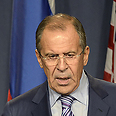
Sergei Lavrov
צילום: AFP
Lavrov: US 'blackmailing' Russia over Syria resolution
Russian FM says Americans blinded by goal of regime change, do not care about true goal of curtailing chemical weapons
Russian Foreign Minister Sergei Lavrov on Sunday accused the United States of blackmailing Russia over a tough UN resolution against Syria, and said the West is blinded by the idea of regime change in the war-torn country.
"Our American partners are beginning to blackmail us: if Russia won't support a resolution under Chapter VII in the UN Security Council, then we will stop the work in the Organization for Prohibition of Chemical Weapons," Lavrov said in a Channel One interview, according to Russian agencies.
Related stories:
He said the OPCW is "about to make a decision" on Syria but the process is threatened by the "arrogant position of some Western partners". "They need Chapter VII, which presumes applying pressure on violators of international law, including sanctions and the possibility of using force," he said.
Lavrov added that Russia would be willing to send troops to Syria as part of an international presence to secure the work of experts on chemical weapons sites.
"We are ready to allocate our servicemen, military police, to participate in such efforts," he said, though adding that he doesn't "think that large contingents are necessary... military observers would be enough.
"Washington, Paris and London want a strongly worded resolution to ensure compliance, possibly under the UN Charter's Chapter VII - a move Lavrov said contradicts the landmark agreement on Syria's chemical disarmament he reached with US Secretary of State John Kerry in Geneva on September 14."Our partners are now blinded by their ideological goal of regime change (in Syria)" Lavrov added. "All they talk about is that Bashar Assad must leave."
"They are only interested in proving their own superiority. Not in the goal that is guiding us, to solve the problem of chemical weapons in Syria," Lavrov said.
Russia's Defense Minister Sergei Shoigu said Thursday that Russia would be unlikely to send elite special forces to Syria, but would readily provide "specialists" for securing chemical stockpiles.
Lavrov on Sunday also contested Assad's claim that the disarmament program requires $1 billion (740 million euros). "In Geneva we discussed the possible cost of this program. The figures were much less substantial," he said.
- Receive Ynetnews updates directly to your desktop










